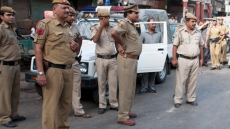In a historic verdict, the Supreme Court on Thursday decriminalised homosexuality between consenting adults by declaring Section 377, the penal provision which criminalised gay sex, as "manifestly arbitrary".
In separate but unanimous verdicts, a five-judge Constitution Bench of Chief Justice Dipak Misra, Justice Rohinton Nariman, Justice A.M. Khanwilkar, Justice D.Y. Chandrachud and Justice Indu Malhotra partially struck down Section 377 of the Indian Penal Code (IPC) as unconstitutional.
The bench said it is no longer an offence for LGBTIQ (lesbian, gay, bisexual, transgender/transsexual, intersex and queer/questioning) community to engage in consensual sex between two adults in private.
Reading out the judgment, Chief Justice Misra said attitudes and mentality have to change to accept others' identity and accept what they are, and not what they should be.
"It is the constitutional and not social morality which will prevail," said the court.
Navtej Singh Johar is a choreographer & dancer who practices the Bharatnatyam, a classical Indian dance form. He was among the 5 petitioners who challenged Section 377 that criminalizes homosexuality, in court. The others are Ritu Dalmia, Sunil Mehra, Keshav Suri, & Aman Nath. pic.twitter.com/oYYwENo2Rd
— Kamal (@KPSinghtweets) September 6, 2018
The verdict sparked celebrations in the LGBTIQ community across India even as the judgment was being read out. Many of the community members who had assembled outside the apex court jumped in joy and distributed sweets.
Chief Justice Misra said consensual sex between adults in a private space, which is not harmful to women or children, cannot be denied as it is a matter of individual choice.
Section 377 will not apply to consensual same-sex acts between homosexuals, heterosexuals, lesbians, the court said, clarifying that sexual act without consent and bestiality will continue to be an offence under section 377.
"An individual has full liberty over his or her body and his or her sexual orientation is a matter of one's choice," said the Chief Justice.
"Time to bid adieu to prejudicial perceptions deeply ingrained in social mindset. Time to empower LGBTIQ community against discrimination. They should be allowed to make their choices," he added.
In a concurring judgement, Justice Nariman said homosexuality is "not a mental disorder or disease".
He said the LGBTIQ community has an equal right to live with dignity and are entitled to equal protection of law. He directed the Centre to give wide publicity to this judgment to remove the stigma attached to homosexuality.
Justice Chandrachud said to deny the LGBTIQ community their right to sexual orientation is a denial of their citizenship and a violation of their privacy.
"They cannot be pushed into obscurity by an oppressive colonial legislation... Sexual minorities in India have lived in fear, hiding as second class citizens," said Justice Chandrachud, adding "the state has no business to intrude on such matters".
Justice Indu Malhotra said that history owes an apology to the LGBTIQ community for all that they have suffered on account of the ignorance of the majority about homosexuality.
"LGBTIQ people have a right to live unshackled from the shadow," she said.
The Supreme Court verdict, which overruled its own earlier judgment, assumes significance as in the earlier round of litigation in 2013, the top court had reversed a Delhi High Court ruling decriminalising homosexuality.
The Delhi High Court bench, headed by then Chief Justice A.P. Shah, had in July 2009 legalised homosexual acts between consenting adults by overturning the 149-year-old law -- finding it unconstitutional and a hurdle in the fight against HIV/AIDS.
In December 2013, a Supreme Court bench comprising Justice G.S. Singhvi and Justice S.J. Mukhopadhaya in the Suresh Kumar Koushal and another vs Naz Foundation and others case, had set aside the high court's judgment and said that it was for the legislature to look into desirability of deleting section 377 of IPC.
The matter was subsequently resurrected in July 2016, when a fresh petition was filed by members of the LGBTIQ community -- dancer N.S. Johar, journalist Sunil Mehra, chef Ritu Dalmia, hotelier Aman Nath and business executive Ayesha Kapur -- which was then marked to the Constitution Bench by a Division Bench.
The reference was made on the basis of submission that it was the first time that individuals directly affected by the provision were approaching the court.
Among the petitioners are a batch of current and former students of Indian Institutes of Technology. Claiming to represent more than 350 LGBTIQ alumni, students, staff and faculty from the IITs, the petitioners said that the existence of Section 377 had caused them "mental trauma and illnesses, such as clinical depression and anxiety and relegated some of them to second-class citizenship".
Love, Actually: Supreme Court Ends Section 377 - 'Country Gets Oxygen Back,' Tweet Karan Johar, Aamir Khan And Others
Karan Johar was the first celebrity to welcome the Supreme Court's landmark judgement abolishing Section 377, under which homosexuality was a criminal offence, in a tweet posted minutes after the verdict was read out by Chief Justice Dipak Misra. "Historical judgement. So proud today.
Decriminalising homosexuality and abolishing #Section377 is a huge thumbs up for humanity and equal rights. The country gets its oxygen back," tweeted the 46-year-old filmmaker. His post was followed by those from Aamir Khan, Deepika Padukone, Katrina Kaif, Alia Bhatt, Anushka Sharma, Ranveer Singh, Sonam Kapoor, Anil Kapoor, Arjun Kapoor, Varun Dhawan, Hrithik Roshan, Twinkle Khanna, Abhishek Bachchan and others.
Historical judgment!!!! So proud today! Decriminalising homosexuality and abolishing #Section377 is a huge thumbs up for humanity and equal rights! The country gets its oxygen back! 👍👍👍💪💪💪🙏🙏🙏 pic.twitter.com/ZOXwKmKDp5
— Karan Johar (@karanjohar) September 6, 2018
Aamir Khan posted a video clip of his show Satyamev Jayate, in which he discussed about 'accepting alternative sexualities,' and tweeted:
We thank the Supreme Court for its decision to strike down article 377. It is a historic day for people who believe in equal rights for all. The judiciary has done it’s duty, and now we must do ours. https://t.co/zzxc4kfNxS
— Aamir Khan (@aamir_khan) September 6, 2018
Love is love 🌈🌈🌈🌈🌈💫 Such a momentous day in the history of our country!!!! Thank you thank you thank you!!!!!! #Section377 #PrideIndia pic.twitter.com/3TbP1pnIxd
— Alia Bhatt (@aliaa08) September 6, 2018
“If you have a heart you should be free to love who you want.” 😍❤️😍So Happy to hear that the Supreme Court of India 🇮🇳 has abolished #section377 decriminalising Homosexuality 👍 #equality #lgbtrights #nodiscrimination #ting pic.twitter.com/47yEBdkul7
— Preity G Zinta (@realpreityzinta) September 6, 2018
A historic day for India! Love for all, freedom for all 🌈 RIP #Section377
— Akshay Kumar (@akshaykumar) September 6, 2018
Section 377 gone! @sifydotcom cartoon #Section377Scrapped pic.twitter.com/fTsnzpxcrP
— Satish Acharya (@satishacharya) September 6, 2018
Indeed a historic day for our country. Much respect for honorary Supreme Court. Coz freedom for love is for all #section377 🌈 #Section377 #377Verdict
— yuvraj singh (@YUVSTRONG12) September 6, 2018
'We are finally free' #Section377 #LGBTQ pic.twitter.com/6XrBZ2j7WH
— The Guardian (@guardian) September 6, 2018
I’ve always been so proud of my Indian heritage.. today I’m bursting with bucket loads of pride.. #LoveWins #Section377 🙏🏽🇮🇳🏳️🌈🙏🏽 pic.twitter.com/OAe5CxhaoA
— Bhavna Limbachia (@BhavnaLimbachia) September 6, 2018
Take pride in whoever you want to be. #Section377 #LoveWins pic.twitter.com/UqUawPB2zB
— Arjun Kapoor (@arjunk26) September 6, 2018
OFFICIAL STATEMENT FROM SHER VANCOUVER ON SECTION 377
Surrey, British Columbia – Sher Vancouver strongly endorses the Supreme Court of India’s decision to scrap Section 377.
This decision gives us hope for India’s future and faith in its institutions.
Section 377 was an outdated British colonial law that was used to discriminate and harass queer people.
The landmark decision today with the support of all the judges on India’s highest court sends a message that LGBTQ people are entitled to basic rights, protection, and an identity.
They can feel proud of who they are. They are not criminals because of their sexual orientation or gender identity.
The court has essentially stated that what mutual consensual adults do privately is their business.
This reminds me of former Prime Minister Pierre Trudeau’s historic statement that “the state has no business in the bedrooms of the nation.”
I am hoping this decision will pave the way to turn India into the “pink capital” of Asia.
Furthermore, this decision may will lead to other changes that support inclusivity and diversity in India such as increased funding for programs and services for LGBTQ people, an enhanced approach to tackle HIV and AIDS, and a more realistic portrayal of LGBTQ people in the media, school curriculum, and even cinema.




